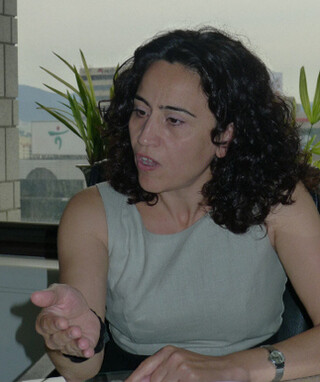hankyoreh
Links to other country sites 다른 나라 사이트 링크
UK expert warns against electric power privatization

By Lee Seung-jun, staff reporter
In an interview with the Hankyoreh, Hulya Dagdeviren, a professor at the University of Hertfordshire in the UK, said, “Countries that privatize their electric power only get short-term benefits. In the end, there will be unwelcome side effects. It would be more appropriate for electric power to be handled by the government and the public sector.”
Dagdeviren was met with a Hankyoreh reporter in the Samsung neighborhood of Seoul on Sep. 5. As she discussed a number of countries that have tried privatizing and marketizing their electric power industry, Dagdeviren
Dagdeviren pointed to problems with the South Korean government’s recent efforts to implement policies that would introduce and expand market competition in the electric power industry. The government intends to expand the share of private-sector power generation from 15% of total power generation at present to 30% by 2027.
Dagdeviren, who is of Turkish descent, is an expert in macroeconomics and international financial crises. She is currently researching marketization and privatization of public resources such as water and electric power, with a particular focus on the electric power industry in Argentina.
Dagdeviren came to South Korea for the first time to be a discussant in an international symposium called “Electric Power Industry in Crisis: What Are the Options?” The symposium is taking place at the COEX Convention Center in the Samsung neighborhood of Seoul on Sep. 6.
The symposium is being jointly organized by members of the National Assembly’s Trade, Industry, and Energy Committee (including the committee chair, Democratic Party lawmaker Kang Chang-il) and the Korean National Electrical Workers Union. The purpose of the symposium is to address the causes of the recent spate of electricity difficulties and to share experiences and problematic issues with cases of marketizing the electric power industry in other countries.
Dagdeviren said that there have been many countries that have made efforts to privatize and liberalize their electric power industry, and that this has had a positive effect on countries that lacked the resources to invest in power facilities. In such countries, she explained, this has resulted in new investment and has led to an increase in electricity supply.
But Dagdeviren went on to say that, in the example of the United Kingdom, the long-term effect of privatization was decreased investment and more costs being shouldered by consumers.
“In England today, the electric power industry is completely privatized,” Dagdeviren said. “Since the financial crisis in 2010, private companies have not been investing in power generation facilities, making it difficult to secure a stable supply of energy. Prices fell early during privatization, but today, electricity bills in the UK are among the highest of OECD countries.”
“As the cost of fuel has increased for older pensioners, ‘fuel poverty’ is becoming a major social problem,” she added. “The profits of private corporations are not funneled back to these people, so in the end the only option is to support them with the money of taxpayers.”
Dagdeviren also gave a word of advice to the South Korean government. “One option is to allow unlimited expansion privately invested power generation. However, there are few examples of government regulation being done properly once privatization has started. The best solution is to leave electric power in the public sector, but if that can’t be done, it is important for the government and public companies to maintain their oversight and to design an effective system of regulation.”
Please direct questions or comments to [english@hani.co.kr]

Editorial・opinion
![[Column] Season 2 of special prosecutor probe may be coming to Korea soon [Column] Season 2 of special prosecutor probe may be coming to Korea soon](https://flexible.img.hani.co.kr/flexible/normal/500/300/imgdb/original/2024/0426/3317141030699447.jpg) [Column] Season 2 of special prosecutor probe may be coming to Korea soon
[Column] Season 2 of special prosecutor probe may be coming to Korea soon![[Column] Park Geun-hye déjà vu in Yoon Suk-yeol [Column] Park Geun-hye déjà vu in Yoon Suk-yeol](https://flexible.img.hani.co.kr/flexible/normal/500/300/imgdb/original/2024/0424/651713945113788.jpg) [Column] Park Geun-hye déjà vu in Yoon Suk-yeol
[Column] Park Geun-hye déjà vu in Yoon Suk-yeol- [Editorial] New weight of N. Korea’s nuclear threats makes dialogue all the more urgent
- [Guest essay] The real reason Korea’s new right wants to dub Rhee a founding father
- [Column] ‘Choson’: Is it time we start referring to N. Korea in its own terms?
- [Editorial] Japan’s rewriting of history with Korea has gone too far
- [Column] The president’s questionable capacity for dialogue
- [Column] Are chaebol firms just pizza pies for families to divvy up as they please?
- [Column] Has Korea, too, crossed the Rubicon on China?
- [Correspondent’s column] In Japan’s alliance with US, echoes of its past alliances with UK
Most viewed articles
- 1‘We must say no’: Seoul defense chief on Korean, USFK involvement in hypothetical Taiwan crisis
- 2Is Japan about to snatch control of Line messenger from Korea’s Naver?
- 3Division commander ordered troops to enter raging flood waters before Marine died, survivor says
- 4[Editorial] Korea’s surprise Q1 growth requires objective assessment, not blind fanfare
- 5[Column] Season 2 of special prosecutor probe may be coming to Korea soon
- 6[Special report- Part III] Curses, verbal abuse, and impossible quotas
- 7Flying “new right” flag, Korea’s Yoon Suk-yeol charges toward ideological rule
- 8[Guest essay] The real reason Korea’s new right wants to dub Rhee a founding father
- 9[Column] ‘Choson’: Is it time we start referring to N. Korea in its own terms?
- 10[Column] Park Geun-hye déjà vu in Yoon Suk-yeol